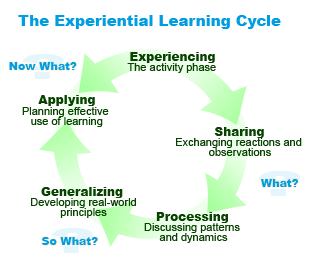Reflection is one of the most academically rigorous components of a service-learning course. Students who take the time to reflect on service-learning experiences will get more from those experiences. This is why reflections are a required part of service-learning classes at the University of Minnesota. Reflection helps students thoughtfully process their community work. It helps them critically assess and understand what they are seeing and doing.
Service-learning practitioners and researchers have concluded that the most effective service-learning experiences are those that provide structured opportunities for learners to critically reflect upon their service experience.
The Experiential Learning Cycle

As students participate in a service-learning class and do the related community work, they should ask themselves these questions: What? So What? Now What? The reflection process begins with a defining and sharing of the "What" of the student's experience, and follows a continuous cycle towards "So What?" and "Now What?"
- What? Report the facts and events of an experience, objectively.
- So What? Analyze the experience.
- Now What? Consider the future impact of the experience on you and the community.
Examples of Reflection Questions
What?
- What happened?
- What did you observe?
- What issue is being addressed or population is being served?
So What?
- Did you learn a new skill or clarify an interest?
- Did you hear, smell, or feel anything that surprised you?
- How is your experience different from what you expected?
- What impacts the way you view the situation/experience? (What lens are you viewing from?)
- What did you like/dislike about the experience?
- What did you learn about the people/community?
- What are some of the pressing needs/issues in the community?
- How does this project address those needs?
Now What?
- What seem to be the root causes of the issue addressed?
- What other work is currently happening to address the issue?
- What learning occurred for you in this experience?
- How can you apply this learning?
- What would you like to learn more about, related to this project or issue?
- What follow-up is needed to address any challenges or difficulties?
- What information can you share with your peers or the community?
- If you could do the project again, what would you do differently?
The Four Cs of Reflection
Effective strategies for fostering reflection are based on four core elements of reflection known as the Four Cs.* These elements are described below:
- Continuous reflection: Reflection should be an ongoing component in the learner's education, happening before, during, and after an experience.
- Connected reflection: Link the "service" in the community with the structured "learning" in the classroom. Without structured reflection, students may fail to bridge the gap between the concrete service experience and the abstract issues discussed in class.
- Challenging reflection: Instructors should be prepared to pose questions and ideas that are unfamiliar or even uncomfortable for consideration by the learner in a respectful atmosphere.
- Contextualized reflection: Ensures that the reflection activities or topics are appropriate and meaningful in relation to the experiences of the students.
Ideas for Reflection
Reflection can happen in the classroom, at the community organization, or individually through course assignments. There are a wide range of meaningful reflective practices and strategies that can be incorporated into service-learning, including the frequently used approaches listed below.
- Journals: Writing in journals is widely used by service-learning programs to promote reflection. They're most meaningful when instructors pose key questions for analysis. (See bottom of page for sample reflection questions.)
- Ethnographies: Students capture their community experience through field notes.
- Case Studies Papers: Students analyze an organizational issue and write a case study that identifies a decision that needs to be made.
- Multimedia Class Presentations: Students create a video or photo documentary on the community experience.
- Theory Application Papers: Students select a major theory covered in the course and analyze its application to the experience in the community.
- Agency Analysis Papers: Students identify organizational structure, culture and mission.
- Presentations to Community Organizations: Students present work to community organization staff, board members, and participants.
- Speakers: Invite community members or organization staff to present in class on their issue area.
- Group Discussion: Through guided discussion questions, have students critically think about their service experiences.
- Community Events: Identify community events that students can attend to learn more about issues.
- Mapping: Create a visual map that shows how the service-learning experience connects to larger issues at the state/national/global level.
- Videos: View a video or documentary to elicit discussion about critical issues that relate to their service experiences.
- Letters-to-the Editor: Students write a letter-to-the-editor or to government officials that address issues important to the community organizations where they are working.
- Creative Projects: Students make a collage or write a poem or song to express an experience.
- Blog: Create a course blog where students can post comments on their experiences.
- Reflective Reading: Find articles, poems, stories or songs that relate to the service students are doing and that create discussion questions.
Sample Reflection Questions
- What is your role at the community site?
- What were your initial expectations? Have these expectations changed? How? Why?
- What about your community involvement has been an eye-opening experience?
- How do you motivate yourself to go to your site when you don't feel like it?
- What specific skills have you used at your community site?
- Describe a person you've encountered in the community who made a strong impression on you, positive or negative.
- Do you see benefits of doing community work? Why or why not?
- Has your view of the population with whom you have been working changed? How?
- How has the environment and social conditions affected the people at your site?
- What institutional structures are in place at your site or in the community? How do they affect the people you work with?
- Has the experience affected your worldview? How?
- Have your career options been expanded by your service experience?
- Why does the organization you are working for exist?
- Did anything about your community involvement surprise you? If so, what?
- What did you do that seemed to be effective or ineffective in the community?
- How does your understanding of the community change as a result of your participation in this project?
- How can you continue your involvement with this group or social issue?
- How can you educate others or raise awareness about this group or social issue?
- What are the most difficult or satisfying parts of your work? Why?
- Talk about any disappointments or successes of your project. What did you learn from it?
- During your community work experience, have you dealt with being an "outsider" at your site? How does being an "outsider" differ from being an "insider"?
- How are your values expressed through your community work?
- What sorts of things make you feel uncomfortable when you are working in the community? Why?
- Complete this sentence: Because of my service-learning, I am....
Faculty Newsletter
Additional reflection tools can be found in our monthly Faculty Newsletter
FOOTNOTES:
- Kolb, David. Experiential Learning Cycle chart.
- Eyler, Janet, and D.E. Giles. A Practitioners Guide to Reflection in Service-Learning. Nashville: Vanderbilt University, 1996.
